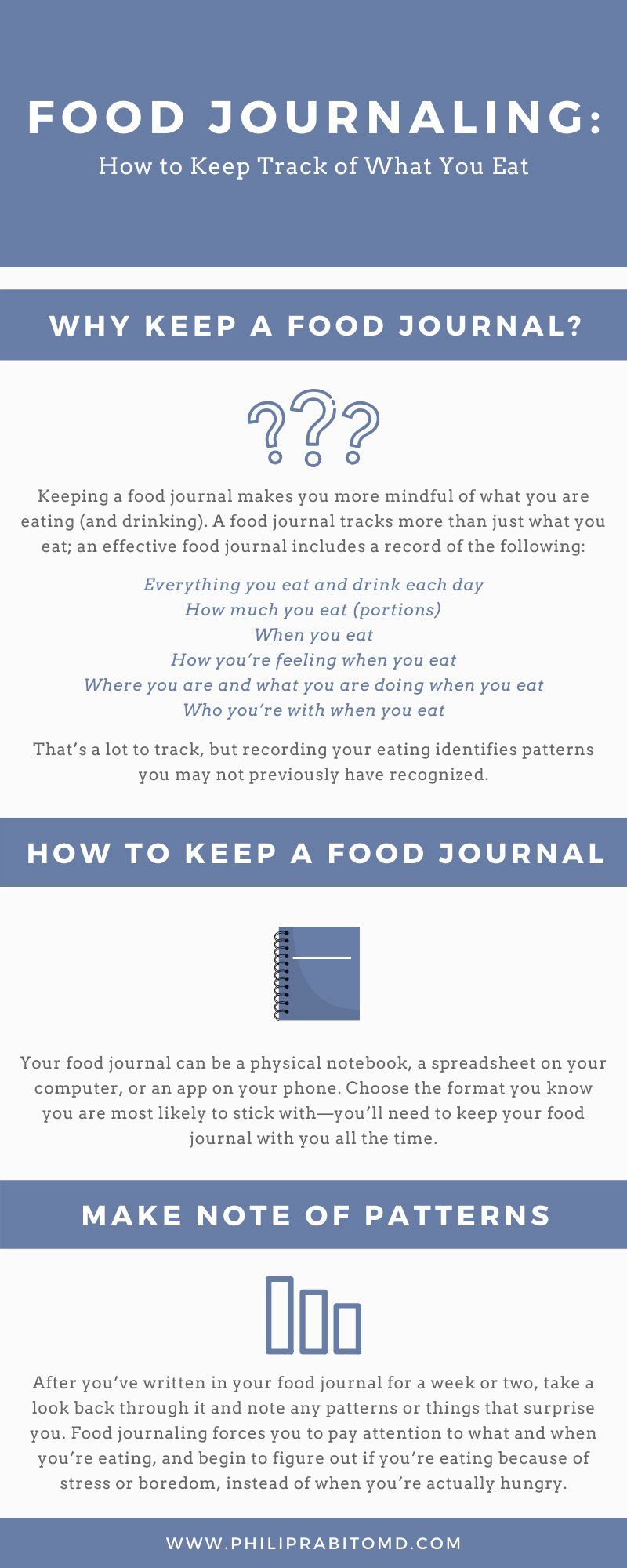
Sometimes, the best way to change a habit is to start a new one. If your goal is weight loss, a positive, proactive approach gets you on the right track. Identifying your current eating habits with a food journal can provide a road map to improving your overall health, losing weight, and feeling better about yourself.
Why Is Keeping a Food Journal Beneficial?
Keeping a food journal makes you more mindful of what you are eating (and drinking). Food journaling also helps your doctor understand your eating habits and identify things you can change to lose weight and feel better. It’s critical to be honest with yourself and your doctor, and to keep an accurate journal that gives the complete picture of your current eating habits. If you are wondering how to keep track of what you eat, food journaling is the answer.
A food journal tracks more than just what you eat; an effective food journal includes a record of the following:
- Everything you eat and drink each day: don’t forget to make note of condiments, sweeteners, cream or milk in your coffee, etc., and how much water you drink.
- How much you eat (portions): your journal should record the quantity of each item you eat or drink, measured in grams, ounces, teaspoons, cups, handfuls or sizes (like “a quarter-sized dollop of mayonnaise”)—whatever measure is convenient, memorable and reasonably accurate.
- When you eat : research continues to confirm that the time of day you eat matters, but the optimal time of day to eat or fast may be different for each person. This depends on individual work and exercise schedules, as well as “circadian rhythms.” The ebb and flow of energy throughout the day may reflect naturally fluctuating hormone levels in the body.
- How you’re feeling when you eat : are you bored, tired, sad, angry, frustrated, or elated when you eat? Emotions play a part in what and when you eat, and hormones play a part in emotions, as well as in physical conditions, such as energy levels.
- Where you are and what you are doing when you eat: provide more detail than just “at work” or “at home.” Are you sitting or standing? In the kitchen, break room, or at your desk? Are you eating on the train, while walking, or sitting on a park bench?
- Who you’re with when you eat: are you alone or with friends or family?
That’s a lot to track, but recording your eating identifies patterns you may not previously have recognized.
How to Keep a Food Journal
Your food journal can be a physical notebook, a spreadsheet on your computer, or an app on your phone. Choose the format you know you are most likely to stick with—you’ll need to keep your food journal with you all the time. You probably already keep your phone with you wherever you go, so an app might be a good choice. You’ll need a journal that makes it easy for you to record what you’re eating and drinking immediately , so you don’t forget or omit things. You could even take time-and-date stamped pictures with your phone of everything you are about to consume and make a note about where you are and how you’re feeling when you snap the photo. You can then record the information in your app or journal.
It shouldn’t surprise you that there are dozens of food journal or food diary apps. Choose one that is strictly for keeping a record of all the things noted above: what, how much, where, when, with whom you are eating, and how you’re feeling. There are many apps linked to particular diet or exercise programs, but you shouldn’t choose one of those without consulting your doctor first. Your doctor will want to get an accurate picture of how you eat now before they recommend any particular regimen.
Make Note of Patterns
After you’ve written in your food journal for a week or two, take a look back through it and note any patterns or things that surprise you. Maybe you thought you were eating plenty of fruits and vegetables, but you discover instead that you’re eating a fruit yogurt with lots of added sugar, or cooked veggies doused in heavy sauces.
You may also notice that you’re “night grazing:” eating well after dinner, before you go to bed. If you do this, notice what you recorded about how you were feeling—was it simply that you felt hungry? Or were you eating for comfort from some emotional upset, or stress about what will come at you at work the next day?
How often do you sit down at a table, with friends or family and few distractions, like screens? Do you find instead that you eat on the run a lot? If you grab a snack between meetings or on the train, notice what sort of snacks you reach for—salty chips, sugary pastries, or whole fruit? Notice how much water you drink per day.
By keeping a food journal, you can identify all your eating habits, for better or worse. You can work with your doctor on how to adjust those habits for optimum health and weight loss, if weight loss is your goal. Perhaps you’re interested in increased energy, better sleep (which also helps with weight loss), or improved athletic performance. When you learn food journaling, and how to keep track of what you eat, you are learning a new habit of conscious, mindful eating, which can move you toward making healthy changes. Food journaling forces you to pay attention to what and when you’re eating, and begin to figure out if you’re eating because of stress or boredom, instead of when you’re actually hungry.
A fast-paced lifestyle can wreak havoc with your eating habits. It’s up to you to take control. This includes consulting your doctor, who may recommend seeking an endocrinologist’s expert advice. An endocrinologist is a doctor who specializes in understanding the system of glands in the body that produce hormones. Hormones regulate a myriad of physical processes. An endocrinologist can specify medical tests to help you understand your personal hormonal profile, and identify hormonal factors affecting your health and weight that you might not have known about. They can figure out if a hormonal imbalance or malfunction of hormone-producing glands is a culprit in symptoms of fatigue, weight gain, or mood disorders.
An endocrinologist is an important partner for anyone who is serious about weight loss and improving their overall health. Dr. Philip Rabito is a top-rated endocrinologist in NYC who provides compassionate, evidence-based treatment for patients seeking help with weight loss, nutrition, and serious conditions such as diabetes or thyroid disorders.


